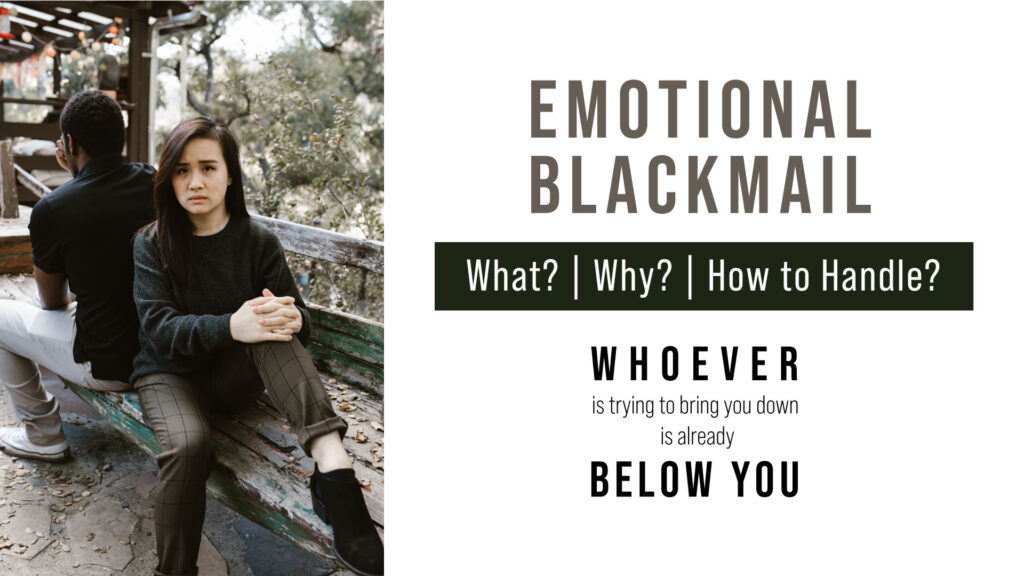EMOTIONAL BLACKMAIL
When the people in your life manipulate you through guilt, obligation, and fear. A term very commonly seen in our society. It has direct and indirect forms. It exists in all kind of relationships practically. Now the question is what exactly is emotional Blackmail?
What is Emotional Blackmail?
When a person exploits your situation, need or feeling and manipulates things to work for their benefit or desire, this is called emotional blackmailing. This can be seen with parents, in relationships, at corporate world practically everywhere.
Most common scenarios
Though the situation varies and the personality and motive of the blackmailer can also vary but most common scenarios that we see around are:
- “If you leave me, I’m going to kill myself.”
- “I tried my best to make you happy. Why can’t you help me with this straightforward task?
- “I’ll reveal your secret to everyone if you won’t do this.”
- “I believed you to love me.”
- “You’d do this for me if you really loved me,”
Who are Emotional Blackmailers?
It occurs when someone close to us takes advantage of our flaws, secrets, and vulnerabilities to their own ends. Emotional blackmail is something people do when they are desperate to get you to do what they want.
In any relationship, where people’s life is closely related, this unpleasant situation arises. Eg. Parents, siblings, partner, colleagues, Boss, friends and the list go on.
Types of Emotional Blackmail:
The most common stages of emotional blackmail are listed here
DEMAND
The blackmailer explains to the victim what they want from them and then threatens them emotionally. Eg. The person may state clearly: “I don’t think you should hang out with so-and-so anymore.” They justify their demand in terms of caring about you. But it’s still an attempt to control your choice of friend.
Resistance
The next stage is where the victim resists the demand. The demands are more than often unreasonable. This is the first step that the victim takes in response to the demand of the blackmailer. And then begins stage 3.
Pressure
Now the blackmailer knows how to handle this resistance and they will come to the main game of blackmailing.When you display resistance in a typical relationship, the other person typically responds by dismissing the subject or attempting to work out a solution with you. A blackmailer will exert pressure on you to comply with their demand, possibly through a number of various methods.
Threats
Here comes in the actual blackmailing. “If you don’t do as I say, then…”. Already a threat attached if you dare not obey their instructions.The threats can be direct or indirect but the agenda behind it is t create pressure on you and make you obey them.
Compliance
In general, the victim will surrender to the threat or rather the emotional blackmail.They can eventually wear you down with pressure and threats, which leads to compliance. When you give in, chaos gives way to peace. They may appear exceptionally nice and compassionate at the time since they have everything they want.
Repetition
Although the cycle of emotional blackmail ends, the pattern has been established, and it is almost assured that it will happen again.When you make it clear that you will eventually give in, the other person will know exactly how to handle the same circumstances in the future.
Emotional blackmail gradually teaches you that complying is simpler than enduring constant pressure and threats. You can come to realize that their affection is conditional and that they won’t give it to you unless you share their viewpoint.
They might even discover that a certain threat will work best for expediting the process. As a result, this pattern is likely to persist.
Understand the Blackmailer to deal with them
People who use emotional blackmail frequently have a troubled past that has caused them to become toxic and destructive in their relationships. In general, it is seen they frequently experienced emotional abuse as children and were the victims of emotional blackmail from their parents.
Most of the times they fail to understand what is typical and what is not, and they may not have enough understanding of what constitutes a healthy connection to be able to create one for themselves.
Some common traits of the blackmailers are:
- Lack of empathy
- Low self esteem
- Tendency to blame others
All these traits are attributed to their troubled past and childhood.
Now comes the point why only a few people fall victim to these blackmailers.

Traits of Victim
Not all people who come in contact with the blackmailers fall victim to them. There are a few traits that the victims display and give the blackmailer a green signal to proceed.
Sounds Strange?
Yes, but it is true. Just check it out.
Blackmailers look for people who are more likely to surrender to their orders. So they target people with these personality traits:
- People who lack self-confidence are less likely to believe they deserve to be in a happy relationship.
- People who are more inclined to succumb to blackmail because they have a greater fear of upsetting other people.
- People who feel a strong sense of duty or obligation are more inclined to believe they should comply with the demands of the emotional blackmailer.
- People with a propensity to easily assume responsibility for others’ feelings and to feel bad for harm they did not cause.
Signs that you are a victim
Here are some signs that you are a victim of emotional blackmail
- Even when you’re not fully sure that you have something to apologize for, you are still apologizing to keep peace.
- You frequently feel obligated to take care of your partner’s emotions.
- You frequently try to predict your partner’s moods out of fear of what they could be feeling.
- You appear to be always giving up things for them without receiving anything in return.
- They appear to be in charge at all times.
How to Handle Emotional Blackmail?
Because the entire aim of emotional blackmail, from the perspective of the blackmailer, is to perplex and disarm you so you don’t know how to deal with them, handling it is exceedingly tough.
You cannot alter their behaviour, which is the first thing to keep in mind. You can only alter your response to it.
The best method to handle emotional blackmail is to fully distance yourself from the blackmailer. You’ll be able to make meaningful decisions after you have some separation from the blackmailer.
- If you do need to speak with the blackmailer, try to avoid becoming emotional and instead be as impartial as you can.
- Make it obvious via your language that you are not responsible for their sentiments. You could apologise if you feel that way.
4 steps turn around
Be rational and calm-
Someone who wants to control you might pressure you to respond right away. When you’re upset and terrified, you could give in without giving other options a full go.
In part because of this, blackmail is effective. Instead, try to remain calm and let them know you need some time.
Try saying, “I can’t decide right now. I’ll consider that and respond to you later.
They can keep urging you to make a decision right away, but resist their pressure (or rise to threats). Repeat firmly that you require time.
Try to have a conversation-
You can construct a strategy to handle the situation using the time you provide yourself. Your strategy may change depending on the situation, including the demand and the conduct.
Assess personal safety first, then start a conversation if you feel both physically and emotionally comfortable doing so.
Tell them how their actions or words make you feel. Give them a chance to alter their conduct.
Identify WHY they chose YOU-
Usually, whoever is trying to manipulate you knows just what buttons to push.
Gaining more insight into the anxieties or convictions that give the blackmailer influence can give you the chance to reclaim that control. It will be far more difficult for the other person to use them against you as a result.
Find a win win situation-
When you give the other person the opportunity to assist you in coming up with an alternative option, your refusal might not sound as blatant.
Open the door to group problem-solving by starting with a statement that affirms their sentiments.
You may say, “I can tell you’re feeling furious since I’m spending the weekend with my pals. Can you explain to me why you’re feeling so frustrated?
This communicates to the other person that you are open to cooperating with them and that you care about how they feel.
Takeaway
Now as you have tried all the possible ways t make peace and things are not coming to an end, my opinion is to leave that relationship or that person, temporarily or permanent. As the situation may be.
After showing them the solution, having discussion if still they are firm on their stand, it shows that the behaviour is certainly intentional. You can not be happy and peaceful in long run. So better take a stand and do what you deem right.
Share this post: on Twitter on Facebook

